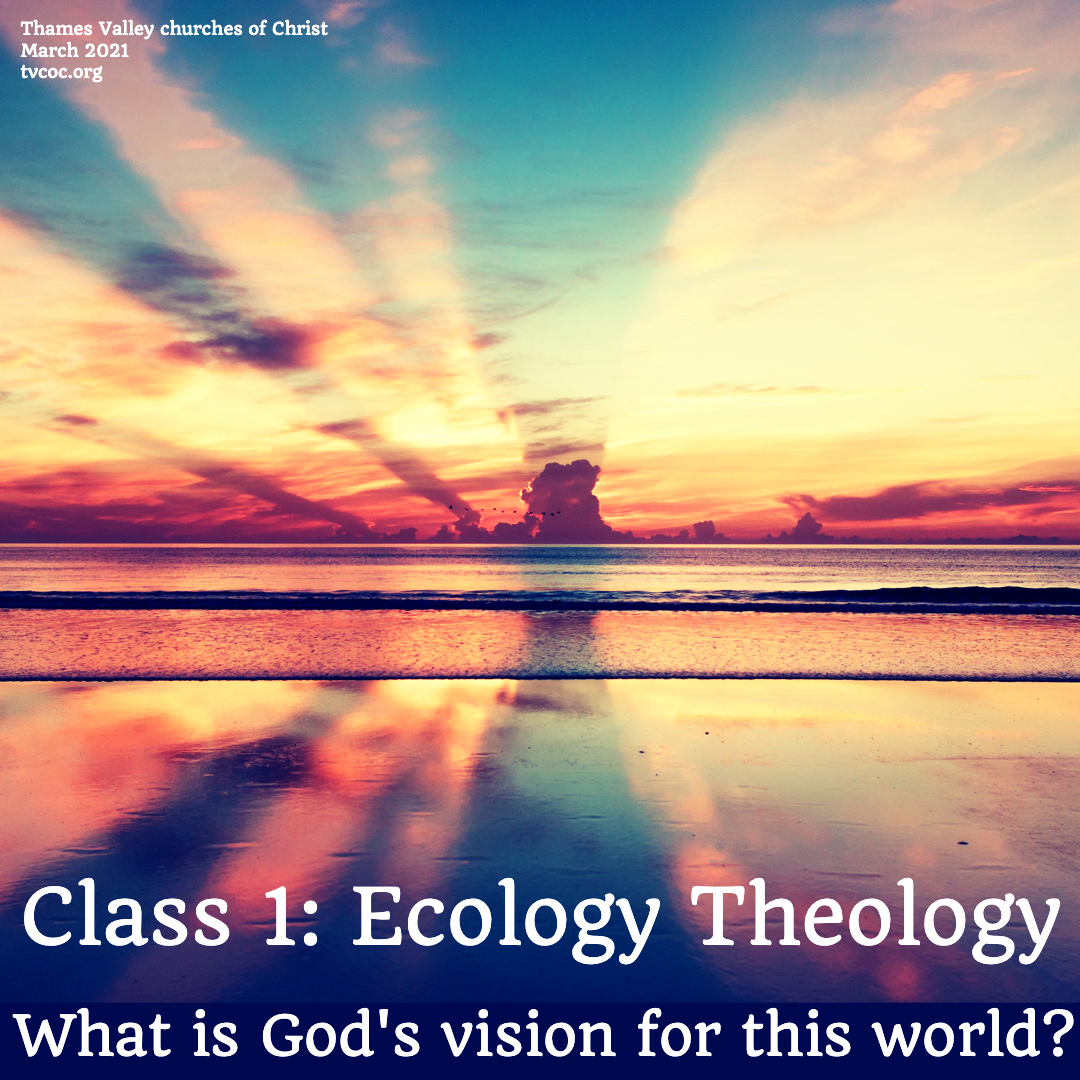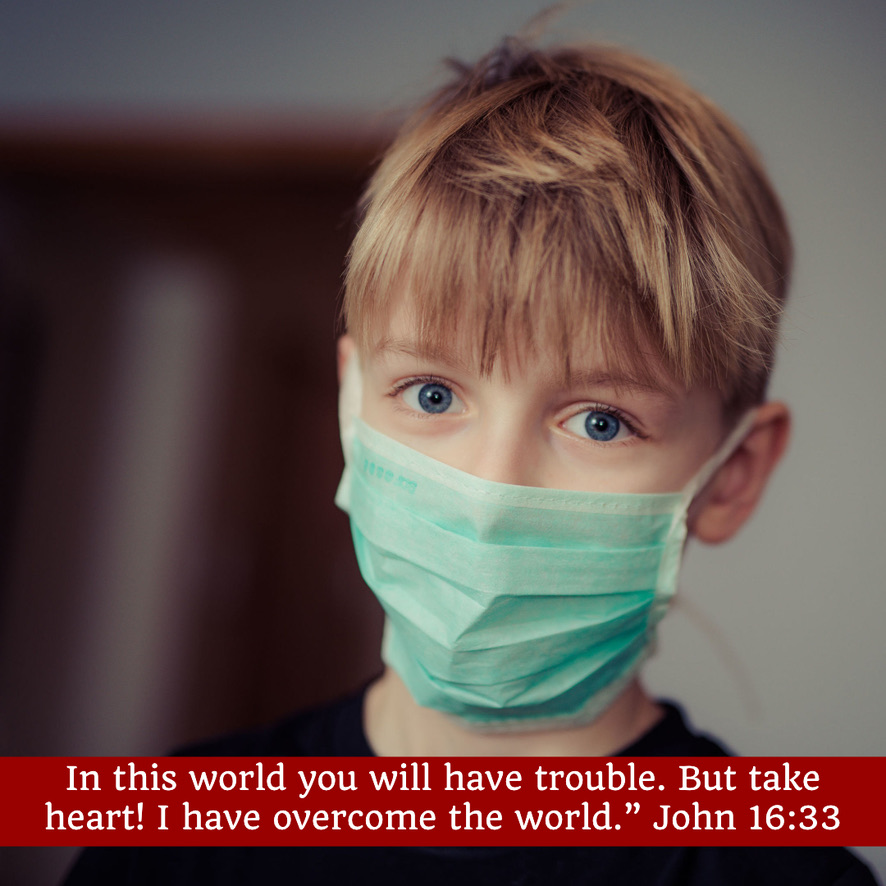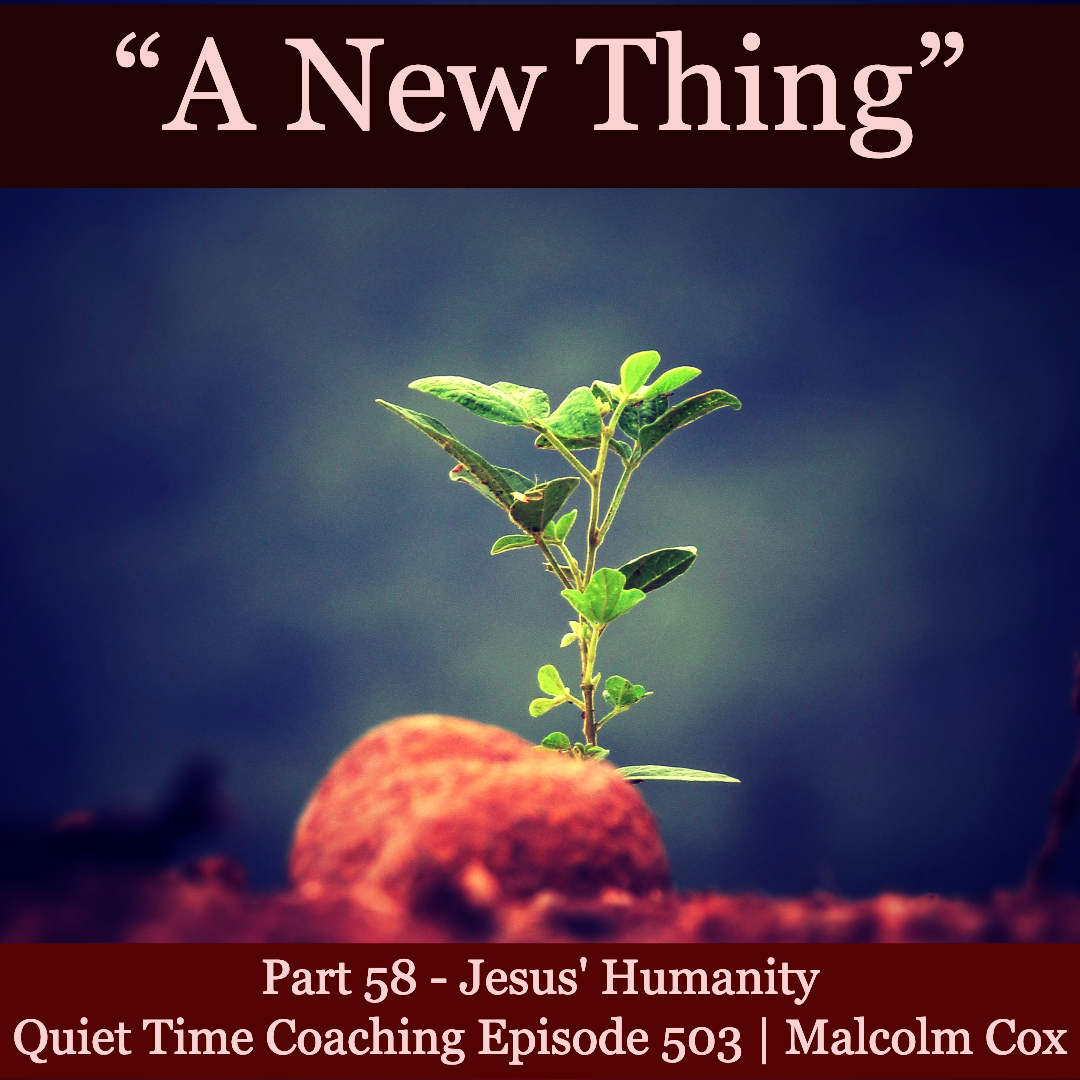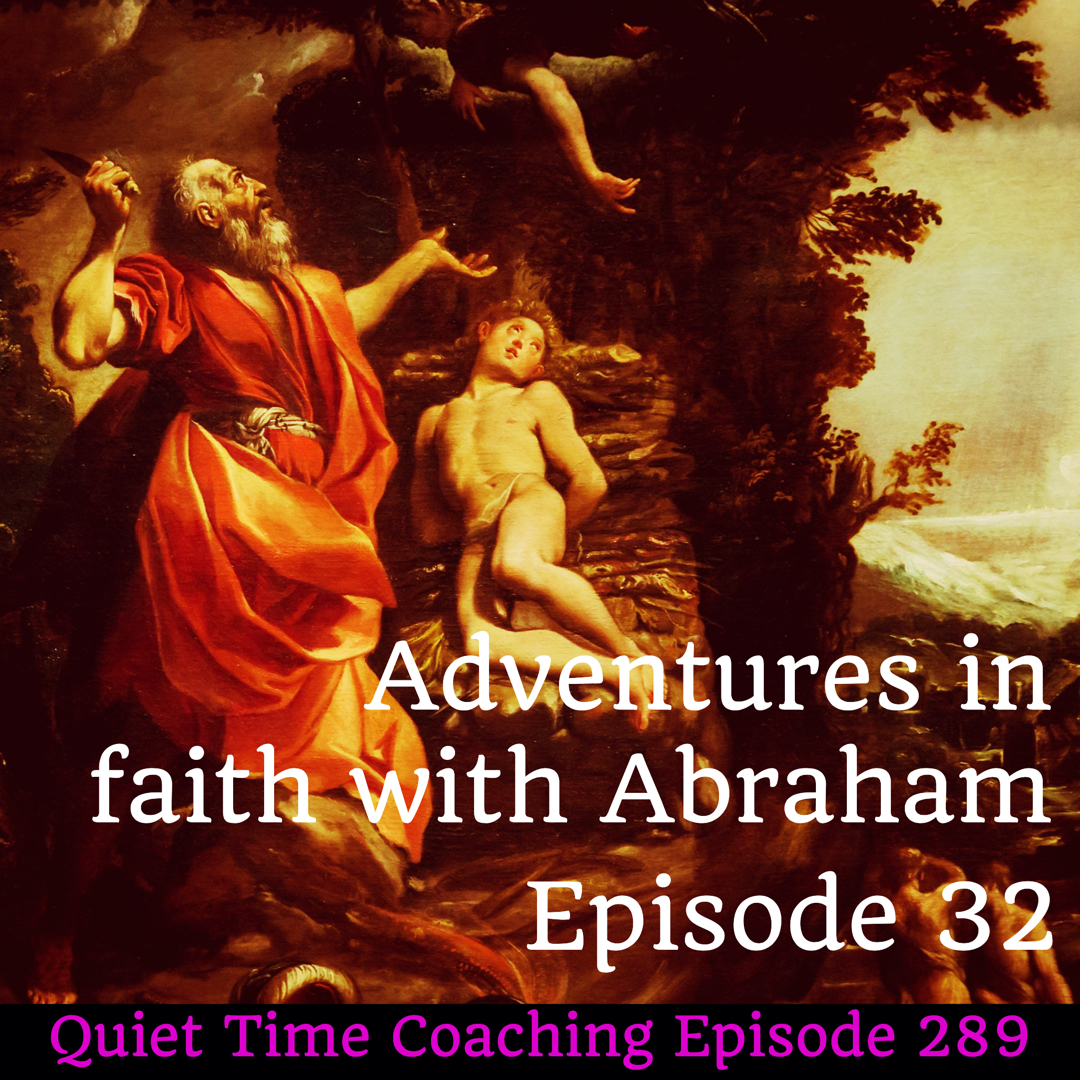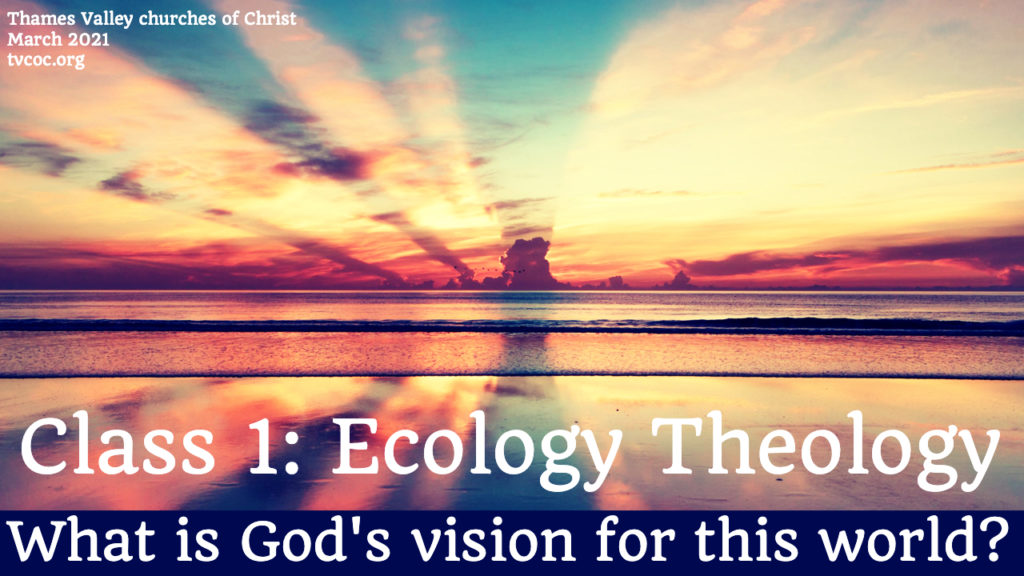
Introduction
- Started “good”, “God saw all that He had made, and behold, it was very good.” (Genesis 1:31 NAS95)
- Will end “good”, “On either side of the river was the tree of life, bearing twelve kinds of fruit, yielding its fruit every month; and the leaves of the tree were for the healing of the nations. There will no longer be any curse;” (Revelation 22:2–3 NAS95)
- If the start is good, and the end is good, how should we treat what we have in the meantime?
- Traditional Christian interpretation is to avoid the question by:
- Focussing on where we are going – ‘to heaven’.
- Dismissing what is going on down here – it will all burn anyway.
- Is this true and accurate?
- What is the impact of such thinking?
- I’m going to argue three things in the second class:
- We are responsible for the impact of our choices regarding how we use this creation
- “Religion that God our Father accepts as pure and faultless is this: to look after orphans and widows in their distress” (James 1:27 NIV11)
- We have an opportunity to partner with God in his desire to draw people to himself through his creation
- “The heavens declare the glory of God; the skies proclaim the work of his hands. Day after day they pour forth speech; night after night they reveal knowledge. They have no speech, they use no words; no sound is heard from them. Yet their voice goes out into all the earth, their words to the ends of the world.” (Psalm 19:1–4 NIV11).
- We have an opportunity to honour God by sharing in his joy at his creation
- “God saw all that He had made, and behold, it was very good.” (Genesis 1:31 NAS95)
- We will address these issues more specifically in the next lesson
- In today’s class we will start by gaining a better theological perspective on the topic of how we should treat God’s creation – in other words, God’s vision
Passage often cited (including by me in the past) as a reason to not be concerned about what happens to this creation:
“But the day of the Lord will come like a thief. The heavens will disappear with a roar; the elements will be destroyed by fire, and the earth and everything done in it will be laid bare. Since everything will be destroyed in this way, what kind of people ought you to be? You ought to live holy and godly lives as you look forward to the day of God and speed its coming. That day will bring about the destruction of the heavens by fire, and the elements will melt in the heat.But in keeping with his promise we are looking forward to a new heaven and a new earth, where righteousness dwells.” (2 Peter 3:10–13 NIV11)
Big issue for this lesson: Are our assumptions about destruction correct?
How do we interpret this passage?
- The language
- Apocalyptic language
- Associated with God intervening, usually in judgment and bringing justice
- “Day of the Lord – 2 Peter 3:10. More on this to come.
- Highly dramatic, imagery-rich and poetic
- Associated with God intervening, usually in judgment and bringing justice
- Legal document written in Rap lyric style?
- “When Israel came out of Egypt, Jacob from a people of foreign tongue, Judah became God’s sanctuary, Israel his dominion. The sea looked and fled, the Jordan turned back; the mountains leaped like rams, the hills like lambs. Why was it, sea, that you fled? Why, Jordan, did you turn back? Why, mountains, did you leap like rams, you hills, like lambs? Tremble, earth, at the presence of the Lord, at the presence of the God of Jacob, who turned the rock into a pool, the hard rock into springs of water.” (Psalm 114:1–8 NIV11)
- Therefore – be careful of literal interpretation of such passages
- The day of the LORD
- Decisive action of God – ending some things and beginning others
- Day of judgement and mercy always attended by terrifying signs in the earth and sky. See:
- “Raise a banner on a bare hilltop, shout to them; beckon to them to enter the gates of the nobles. I have commanded those I prepared for battle; I have summoned my warriors to carry out my wrath—those who rejoice in my triumph. Listen, a noise on the mountains, like that of a great multitude! Listen, an uproar among the kingdoms, like nations massing together! The LORD Almighty is mustering an army for war. They come from faraway lands, from the ends of the heavens—the LORD and the weapons of his wrath—to destroy the whole country. Wail, for the day of the LORD is near; it will come like destruction from the Almighty. Because of this, all hands will go limp, every heart will melt with fear. Terror will seize them, pain and anguish will grip them; they will writhe like a woman in labor. They will look aghast at each other, their faces aflame. See, the day of the LORD is coming -a cruel day, with wrath and fierce anger—to make the land desolate and destroy the sinners within it. The stars of heaven and their constellations will not show their light. The rising sun will be darkened and the moon will not give its light. I will punish the world for its evil, the wicked for their sins. I will put an end to the arrogance of the haughty and will humble the pride of the ruthless. I will make people scarcer than pure gold, more rare than the gold of Ophir. Therefore I will make the heavens tremble; and the earth will shake from its place at the wrath of the LORD Almighty, in the day of his burning anger.” (Isaiah 13:2–13 NIV11)
- Judgement, Justice and Mercy leading to liberation, peace and prosperity (see also Jeremiah 46:10; Ezekiel 7:10; 13:5; 30:6; Daniel 2:31-35; Joel 1:15; 2:1, 11; 3:4, 14; Amos 5:18, 20; Obadiah 15; Zephaniah 1:7, 14; Malachi 4:1, 5…).
- Is. 65:17-25 “See, I will create new heavens and a new earth. The former things will not be remembered, nor will they come to mind. But be glad and rejoice forever in what I will create, for I will create Jerusalem to be a delight and its people a joy. I will rejoice over Jerusalem and take delight in my people; the sound of weeping and of crying will be heard in it no more. “Never again will there be in it an infant who lives but a few days, or an old man who does not live out his years; the one who dies at a hundred will be thought a mere child; the one who fails to reach a hundred will be considered accursed. They will build houses and dwell in them; they will plant vineyards and eat their fruit. No longer will they build houses and others live in them, or plant and others eat. For as the days of a tree, so will be the days of my people; my chosen ones will long enjoy the work of their hands. They will not labour in vain, nor will they bear children doomed to misfortune; for they will be a people blessed by the LORD, they and their descendants with them. Before they call I will answer; while they are still speaking I will hear. The wolf and the lamb will feed together, and the lion will eat straw like the ox, and dust will be the serpent’s food. They will neither harm nor destroy on all my holy mountain,” says the LORD. (See also Isaiah 11:6-9; Hosea 2:18.)
- Future era of blessing for God’s people in new harmonious creation.
- End to sorrow, pain and premature death – vv19-20.
- Self-sufficiency, prosperity and fulfilment – vv21-23.
- Intimacy with God – v24.
- Ecological balance – v25.
- Not literal, but a radical remaking of the natural order returning to Eden. What is the substance of this vision?
1. Physical vision – houses etc are real and material. “There are no disembodied spirits strumming hearts on ethereal clouds here.” 124.
2. Earthly vision. Not about going to heaven, but “about the earthing of heaven into creation.” “creation is healed of human suffering and of conflict between animals, as God’s kingly rule is re-established.” 124
- OT “day of the LORD” is looking forward to a newness which is a renewal and a return
- The coming of the Christ
- Parousia – Jesus is coming back
- Whatever the details…something climactic is coming when things will change
- A climatic day will bring what has been begun to completion:
- “But the day of the Lord will come like a thief. The heavens will disappear with a roar; the elements will be destroyed by fire, and the earth and everything done in it will be laid bare. Since everything will be destroyed in this way, what kind of people ought you to be? You ought to live holy and godly lives as you look forward to the day of God and speed its coming. That day will bring about the destruction of the heavens by fire, and the elements will melt in the heat. But in keeping with his promise we are looking forward to a new heaven and a new earth, where righteousness dwells.” (2 Peter 3:10–13 NIV11)
- Context: decisive cleansing judgement, evil destroyed, God’s creation purified. Judgment will refine, purify, renew.
- Parallel with Noah’s flood (vv5-7) makes it clear. Earth not destroyed in flood. “The picture is of selective judgement, not complete destruction. Just as the water of the flood cleansed the earth, so the refiner’s fire of verse seven will purify the world from evil, but not annihilate it.” Page 126.
- ‘Elements’ – not periodic table, elemental forces of the universe, the distorted powers which have thwarted God’s rule on earth.
- Earth not burned up, but ‘laid bare’ or disclosed.
- Jesus came to show us how to live in harmony with creation as it was meant to be, not how to escape it.
- New isn’t new
- New / renew
- Rev 21/22
- “Then I saw “a new heaven and a new earth,” for the first heaven and the first earth had passed away, and there was no longer any sea. I saw the Holy City, the new Jerusalem, coming down out of heaven from God, prepared as a bride beautifully dressed for her husband. And I heard a loud voice from the throne saying, “Look! God’s dwelling place is now among the people, and he will dwell with them. They will be his people, and God himself will be with them and be their God.‘He will wipe every tear from their eyes. There will be no more death or mourning or crying or pain, for the old order of things has passed away.”” (Revelation 21:1–4 NIV11)
- “He said to me: “It is done. I am the Alpha and the Omega, the Beginning and the End. To the thirsty I will give water without cost from the spring of the water of life.Those who are victorious will inherit all this, and I will be their God and they will be my children.” (Revelation 21:6–7 NIV11)
- Verse one – annihilation of present and earth, replacement by new? No, three reasons:
- Poetic language – see the rest of Revelation. “The emphasis of the symbolic language is not on destroying the old, but on “making everything new” (21:5) as God comes down from heaven, removing sin and chaos (the sea being a common old Testament metaphor for the forces of chaos), and makes his home with humanity.” Page 124.
- Clear links with new earth of Isaiah 65, and first creation, Genesis 1-2. Paradise regained. Tree of life (Genesis 2:9) was inaccessible after fall, now provides healing and fruit (Revelation 22:2).
- “On each side of the river stood the tree of life, bearing twelve crops of fruit, yielding its fruit every month. And the leaves of the tree are for the healing of the nations.” (Revelation 22:2 NIV11)
- The curse replaced by new intimacy.
- New does not necessarily mean brand-new but renewed. New Testament Greek, two words for new, neos – totally new, kainos – new as to form or quality. Bible consistently uses latter for new creation (Revelation 3:12; 21:2; 21 1; 2 Peter 3:13; Revelation 21:5). See similar imagery 2 Corinthians 5:17.
- “Therefore, if anyone is in Christ, the new creation has come: The old has gone, the new is here!” (2 Corinthians 5:17 NIV11)
- “In the same way that God recycles broken, scarred, twisted human beings into new creations in Christ, so the “old” earth will be recycled into God’s new creation, where “the kingdom of the world has become the kingdom of our Lord and of his Christ, and he will reign for ever and ever” (Revelation 11:15). Page 125.
- ‘Heaven’ is the new heaven and new earth, new Jerusalem, Revelation 21:1-2.
- Beautiful, safe, lit up, fruit. Sounds like Eden. Heaven is in reality Eden restored.
- The new city will be a “green” city:
- “Then the angel showed me the river of the water of life, as clear as crystal, flowing from the throne of God and of the Lamb down the middle of the great street of the city. On each side of the river stood the tree of life, bearing twelve crops of fruit, yielding its fruit every month. And the leaves of the tree are for the healing of the nations. No longer will there be any curse. The throne of God and of the Lamb will be in the city, and his servants will serve him. They will see his face, and his name will be on their foreheads.There will be no more night. They will not need the light of a lamp or the light of the sun, for the Lord God will give them light. And they will reign for ever and ever.” (Revelation 22:1–5 NIV11)
- The frustrated liberated, Rom 8
- “I consider that our present sufferings are not worth comparing with the glory that will be revealed in us. For the creation waits in eager expectation for the children of God to be revealed. For the creation was subjected to frustration, not by its own choice, but by the will of the one who subjected it, in hope that the creation itself will be liberated from its bondage to decay and brought into the freedom and glory of the children of God. We know that the whole creation has been groaning as in the pains of childbirth right up to the present time. Not only so, but we ourselves, who have the firstfruits of the Spirit, groan inwardly as we wait eagerly for our adoption to sonship, the redemption of our bodies. For in this hope we were saved. But hope that is seen is no hope at all. Who hopes for what they already have? But if we hope for what we do not yet have, we wait for it patiently.” (Romans 8:18–25 NIV11)
- Not obliterated but resurrection.
- All creation suffered because of rebellion in Eden. Waiting for relief of its frustration. “The Greek in this passage suggests that “creation has been unable to attain the purpose for which it was created.” Why? Because the adama (the cultivated soil) was subjected to ineffectiveness because of the rebellion of adam…. Creation experiences the same “bondage of decay” as does the human race.”
- Death defeated, curse repealed, reconciliation with God and Eden. Romans 8 juxtaposes resurrection of humanity with the resurrection of creation. Nature, like humankind, not destined for destruction but transformation.
- God’s dream is the liberation of creation from decay.
- Therefore we should participate in liberating creation from decay – not speed it up!
Conclusion
- “We are fuelled by a moral perspective, not simply a pragmatic one. We cannot fix everything, but we can be bold in our difference. A light in the darkness, a leaven in the lump.” Sandra Richter, Stewards of Eden
- God created something beautiful. We’re called to imitate God. The least we can do is try to reverse the uglification of creation. This means we must not be guilty of making things worse, but better. It is not acceptable to be passive, but imperative to be healing the damage done to this world by ignorance and violence.
- When you pray the Lord’s prayer perhaps think a bit differently about “your kingdom come, your will be done on earth as it is in heaven”
- Next time: Compassion and justice for the vulnerable; creation evangelism and God’s joy
Please add your comments on this week’s topic. We learn best when we learn in community. Do you have a question about teaching the Bible? Is it theological, technical, practical? Send me your questions or suggestions. Here’s the email: [malcolm@malcolmcox.org](mailto:malcolm@malcolmcox.org). If you’d like a copy of my free eBook on spiritual disciplines, “How God grows His people”, sign up at my website: http://[www.malcolmcox.org](http://www.malcolmcox.org/). Please pass the link on, subscribe, leave a review. “Worship the LORD with gladness; come before him with joyful songs.” (Psalms 100:2 NIV11)
God bless, Malcolm
